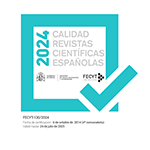"Qua licet et sequitur pudor est miscendus Amor" (OV.epist.4.9): the Transgression of Limits and the Limits of Transgression on Phaedra’s Letter
Abstract
Phaedra’s epistle to Hippolytus generally stands out in the Heroides, among other reasons for being a letter of seduction. However, even though it is one at the beginning, later on Phaedra’s voice gradually changes until it becomes a discourse of open persuasion and finally, a supplication. To devise the words he attributes to the Cretan heroine, Ovid took his inspiration from those Euripides gave her earlier on in his tragedies, but in the elegiac transposition of the tragic heroine, he employed, above all, his own voice as elegiac poet, which determines Phaedra’s masculine attitudes in a position of power with respect to her young addressee. Nevertheless, the feminine voice of Sulpicia and that which the amicus Sulpiciae lends her are also employed. In the study of these combinations of voices we point up the transgression of limits of gender and and their limitations.Downloads
Article download
License
In order to support the global exchange of knowledge, the journal Cuadernos de Filología Clásica. Estudios latinos is allowing unrestricted access to its content as from its publication in this electronic edition, and as such it is an open-access journal. The originals published in this journal are the property of the Complutense University of Madrid and any reproduction thereof in full or in part must cite the source. All content is distributed under a Creative Commons Attribution 4.0 use and distribution licence (CC BY 4.0). This circumstance must be expressly stated in these terms where necessary. You can view the summary and the complete legal text of the licence.








